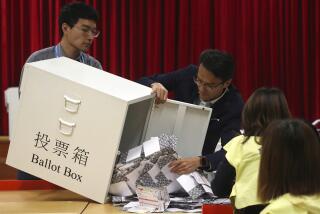Hong Kong Liberals Seek More Power : Colony: The winning party’s leader says the British governor should yield authority to elected legislators.
- Share via
HONG KONG — Martin Lee, the most prominent leader of democratic activists in Hong Kong, called Monday for the London-appointed governor to turn over a large part of his power to liberal candidates who won a landslide victory in this British colony’s first direct legislative election.
“Until yesterday, there was nobody in Hong Kong who could actually stand up and say, ‘I represent the people of Hong Kong,’ ” Lee, chairman of the United Democrats of Hong Kong, said Monday at a victory press conference. “Both the Chinese and British governments were able to take full advantage of that and pretended that they could decide for the people of Hong Kong.
“Now that there are 18 directly elected representatives of the people--and we have two-thirds of them--I think it is only right that both the Chinese and the British governments should listen to the views of the people as expressed by their duly elected members in the Legislative Council,” he said.
Liberal candidates won 16 of 18 directly elected Legislative Council seats in Sunday’s election, with Lee’s United Democrats taking 12 of the seats. Two seats went to independent moderates.
The key platform plank of all liberal candidates was a call for accelerated political reform in Hong Kong. The election was the first in 150 years of British rule in which the people of Hong Kong could directly elect some of their legislative representatives.
Pro-democracy activists wish to build as much self-rule as possible before the scheduled 1997 return of Hong Kong to Chinese sovereignty, in the belief this could help ensure that Beijing honors its promises to preserve Hong Kong’s civil liberties and capitalist system.
The 60-member Legislative Council also includes 21 members elected by selected occupational groups called “functional constituencies,” four ex-officio members and 17 members appointed by the governor. Functional constituency voting was last week, but Gov. David Wilson has not yet named his appointees.
Under Hong Kong’s government system, the Legislative Council is largely an advisory body. More power is held by the 15-member Executive Council, which includes four ex-officio members and 11 gubernatorial appointees. The Executive Council meets behind closed doors and requires members to refrain from public disagreement with its decisions. While in theory the Executive Council also plays a largely advisory role to the governor, in practice it has great influence in the government.
Lee called on the governor Monday to grant victorious legislative candidates decisive influence over these bodies by allowing them to present a “short list” of suggested appointees. The government should also change Executive Council rules so politicians responsible to the people can publicly disagree with majority decisions, he said.
There was no immediate response from Wilson to Lee’s statements. A meeting between the two is scheduled for today.
Lee said the unexpected low turnout in Sunday’s election, with 39% of registered voters casting ballots, was not so poor as to leave any doubt that Hong Kong residents “wish to have democracy, like any people in the world.”
Victorious liberals, he said, will press for at least 50% of Legislative Council seats to be chosen directly by voters in the next election, set for 1995. Current plans, agreed to by London and Beijing, call for only one-third of the seats to be chosen directly that year. Beijing has said that revision of that plan is impossible, but Lee said he does not accept this.
“If China wants Hong Kong to continue as a prosperous international city,” he said, “I think it is only obvious that the wishes of the people of Hong Kong be heard.”
More to Read
Sign up for Essential California
The most important California stories and recommendations in your inbox every morning.
You may occasionally receive promotional content from the Los Angeles Times.













